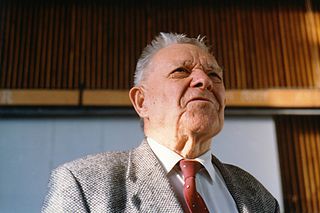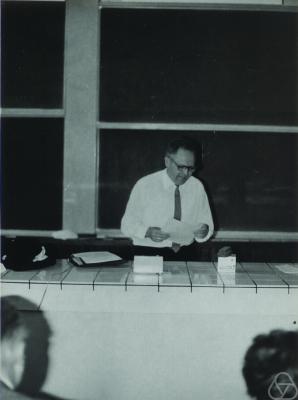Related Research Articles

Israel Moiseevich Gelfand, also written Israïl Moyseyovich Gel'fand, or Izrail M. Gelfand was a prominent Soviet-American mathematician. He made significant contributions to many branches of mathematics, including group theory, representation theory and functional analysis. The recipient of many awards, including the Order of Lenin and the first Wolf Prize, he was a Foreign Fellow of the Royal Society and professor at Moscow State University and, after immigrating to the United States shortly before his 76th birthday, at Rutgers University. Gelfand is also a 1994 MacArthur Fellow.

Alexander Alexandrovich Friedmann was a Russian and Soviet physicist and mathematician. He originated the pioneering theory that the universe is expanding, governed by a set of equations he developed known as the Friedmann equations.

Yakov Grigorevich Sinai is a Russian–American mathematician known for his work on dynamical systems. He contributed to the modern metric theory of dynamical systems and connected the world of deterministic (dynamical) systems with the world of probabilistic (stochastic) systems. He has also worked on mathematical physics and probability theory. His efforts have provided the groundwork for advances in the physical sciences.

Nikolay Nikolayevich Bogolyubov was a Soviet, Ukrainian and Russian mathematician and theoretical physicist known for a significant contribution to quantum field theory, classical and quantum statistical mechanics, and the theory of dynamical systems; he was the recipient of the 1992 Dirac Medal for his works and studies.
Aleksandr Aleksandrovich Andronov was a Soviet physicist and member of the Soviet Academy of Sciences (1946). He worked extensively on the theory of stability of dynamical systems, introducing the notion of structural stability. In that context, he also contributed to the mathematical theory of self-oscillation by establishing a link between the generation of oscillations and the theory of Lyapunov stability. He developed the comprehensive theory of self-oscillations by linking it with the qualitative theory of differential equations, topology, and with the general theory of stability of motion. The crater Andronov on the Moon is named after him.
Volodymyr Oleksandrovych Marchenko is a Soviet and Ukrainian mathematician who specialises in mathematical physics.

Sergey Mikhailovich Nikolsky was a Soviet and Russian mathematician.

The MSU Faculty of Mechanics and Mathematics is a faculty of Moscow State University.
Anatoly Aleksandrovich Vlasov was a Russian, later Soviet, theoretical physicist prominent in the fields of statistical mechanics, kinetics, and especially in plasma physics.

Roland Lvovich Dobrushin was a mathematician who made important contributions to probability theory, mathematical physics, and information theory.

Naum Ilyich Akhiezer was a Soviet and Ukrainian mathematician of Jewish origin, known for his works in approximation theory and the theory of differential and integral operators. He is also known as the author of classical books on various subjects in analysis, and for his work on the history of mathematics. He is the brother of the theoretical physicist Aleksandr Akhiezer.

Isaak Moiseevich Yaglom was a Soviet mathematician and author of popular mathematics books, some with his twin Akiva Yaglom.

Nikolay Nikolayevich Konstantinov was a leading Soviet and Russian mathematical educator and organizer of numerous mathematics competitions for high school students. He is best known as the creator of the system of math schools and math classes and as the creator and chief organizer of the Tournament of the Towns. For his work he was awarded the Paul Erdős award in 1992.

Vasily Sergeyevich Vladimirov was a Soviet and Russian mathematician working in the fields of number theory, mathematical physics, quantum field theory, numerical analysis, generalized functions, several complex variables, p-adic analysis, multidimensional Tauberian theorems.

Akiva Moiseevich Yaglom was a Soviet and Russian physicist, mathematician, statistician, and meteorologist. He was known for his contributions to the statistical theory of turbulence and theory of random processes. Yaglom spent most of his career in Russia working in various institutions, including the Institute of Theoretical Geophysics.

Boris Yakovlevich Levin was a Soviet mathematician who made significant contributions to function theory.
Yuri Aleksandrovich Romanov was a Russian physicist who spent his career in the former Soviet program of nuclear weapons.
Mark Iosifovich Graev was a Russian mathematician. He is known as one of the namesakes in the Gelfand–Graev representation.
Mikhail Kapranov, is a Russian mathematician, specializing in algebraic geometry, representation theory, mathematical physics, and category theory. He is currently a professor of the Kavli Institute for the Physics and Mathematics of the Universe at the University of Tokyo.
Dmitrii Abramovich Raikov was a Russian mathematician who studied functional analysis.
References
- Felix Berezin at the Mathematics Genealogy Project
- Yu. I. Manin; M. A. Markov; S. P. Novikov; V. I. Ogievetsky; V. Ya. Faynberg; E. S. Fradkin (1981). "Feliks Aleksandrovich Berezin". Soviet Physics Uspekhi (Obituary). 24 (6): 528–529. Bibcode:1981SvPhU..24..528M. doi:10.1070/PU1981v024n06ABEH004854. (also available in Russian)
- Robert A. Minlos (2005). "Felix Alexandrovich Berezin (A Brief Scientific Biography)". Letters in Mathematical Physics. 74 (1): 5–19. Bibcode:2005LMaPh..74....5M. doi:10.1007/s11005-005-0023-9. S2CID 121133609.
- N. N. Bogolyubov; I. M. Gelfand; R. L. Dobrushin; A. A. Kirillov; M. G. Krein; D. A. Leites; R. A. Minlos; Ya. G. Sinai; M. A. Shubin (1981). "Feliks Aleksandrovich Berezin. Obituary". Uspekhi Mat. Nauk (in Russian). 36 (4): 185–190.
- Mikhail Shifman, ed. (2007). Felix Berezin, The Life and Death of the Mastermind of Supermathematics. Singapore: World Scientific. ISBN 978-981-270-532-7. Archived from the original on 2007-09-27. Retrieved 2007-01-09.